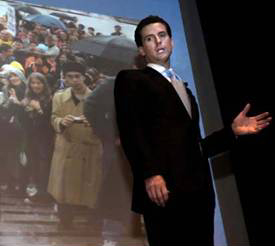Newsom cites strides in Muni and homelessness in State of the City

Cecilia M. Vega, Chronicle Staff Writer
San Francisco has made sweeping strides during the past four years - from providing housing for the homeless to improving Muni's reliability - Mayor Gavin Newsom said Monday in the final State of the City address of his first term.
Just eight days before he is expected to be re-elected, Newsom painted a positive picture of life in San Francisco and avoided making any big election-year promises - or even dropping any hints of what the next four years might bring.
Instead, he spent nearly 95 minutes reciting a long list of statistics in a speech titled "Progress by the Numbers," saying he wanted to convince naysayers of the city's advancements by using "uncontrovertible" and "absolute" facts.
"I believe this city is better off than it was four years ago," said Newsom, who is running for re-election in a race without any challengers who pose a serious political threat. "You took me on faith when you elected me four years ago, and now you've got a record."
Newsom, whose previous three State of the City addresses have been delivered from behind a podium and read nearly verbatim from a prepared speech, delivered a PowerPoint presentation this year reminiscent of Al Gore in his documentary, "An Inconvenient Truth." Newsom used charts and graphs to illustrate the progress he said San Francisco has made since he took office in 2004. In a presentation bordering on both a commercial for his administration and a college lecture series, Newsom carried a wireless microphone and walked around the stage and through the aisles in an auditorium at UCSF's Mission Bay campus, at one point briefly taking a seat next to an audience member.
He highlighted an economy on the rise from the dot-com bust, a decrease in serious crimes and the creation of thousands of units of affordable housing.
"I get that it's an election-year, so it don't matter much what I say, 'cause everything's going to be framed in the context of an election," cautioned Newsom who, despite being a Bay Area native, at times incorporated a southern drawl and down-home manner of speech.
There was no mention of the sex scandal that rocked his administration earlier this year, and this year's spike in homicides was touched on 13 minutes before the end of the speech. "When you're telling the story, you get to tell the story the way you want to tell it," said Board of Supervisors President Aaron Peskin, who attended the speech. "So you don't put homicide stats at the beginning of your presentation. History gets to be told by the winners."
Newsom focused heavily on the solid economy, noting how the city's budget had $147 million in reserves last fiscal year, compared with $84.3 million in 2004, and that the hotel occupancy rate is back on the rise after a decline in the wake of the Sept. 11, 2001, terrorist attacks.
Delivering his speech from Mission Bay, the hub of the city's emerging biotech industry, Newsom said there were just three biotech companies located in San Francisco four years ago, compared with 39 today.
Thanks to record investments in capital improvements, Newsom said, streets, sidewalks and parks are better off now than they were when he took office, though he conceded, "We have got to do a better job of cleaning our streets."
One of the few hints Newsom gave of what a second term might look like came when he talked about the need to rebuild San Francisco General Hospital, which faces being shut down if more than $622 million in retrofit improvements are not made.
Newsom had said securing voter approval for a bond to pay for the hospital rebuild would be his top priority for 2006, but he backed down from the promise after polling showed voters were not likely to approve such an initiative. On Monday, Newsom said he wants to ask voters to weigh in on the issue in November 2008.
"There is nothing more important in my mind," he said.
But while the portrait Newsom painted of San Francisco was an overwhelmingly rosy one, others in the city don't necessarily see it that way.
Ted Gullicksen of the San Francisco Tenants Union said people are lining up daily for assistance at his Mission District office because they are being kicked out of their homes.
Newsom showed a chart to illustrate that evictions are down, but Gullicksen said that anecdotally, San Francisco remains a difficult place to live for the poor and working class.
"In terms of displacement and gentrification, it's pretty much worse than ever," Gullicksen said. "Even with the (eviction) numbers being down, there are threats by landlords that are forcing people out of their homes and the numbers of units being lost is actually up."
Newsom cited statistic after statistic to show that San Francisco is in good shape.
"Oftentimes we see in politics that opinions get in the way of the facts or oftentimes fiction gets masqueraded as facts," Newsom said.
Despite public frustration with the city's public transportation system, Newsom said Muni's on-time performance rate rose from 65.5 percent in the 2001-02 fiscal year to 71.9 percent last year. The city's goal, however, is for Muni buses and trains to be on time 80 to 85 percent of the time.
More than 7,980 units of housing have been preserved or built since Newsom took office, he said, and 6,288 homeless people have been moved off the streets and into housing under his watch, which he called "a good start."
Serious crimes - such as rape, aggravated assault and burglary - are down. But there have been 88 homicides this year, putting San Francisco on pace to far exceed the 85 slayings that occurred on city streets in 2006. In 2005, there were 96 homicides - a high for the decade.
"I'm not satisfied," Newsom said of the crime trends. "No one is." Despite Newsom's assertions, the overall progress of the city remains debatable to some.
"There's just a ton of people who are living in substandard conditions and paying market-rate rents to do so," said Tom Jackson, director of organizing for Coleman Advocates for Youth, which lobbies City Hall on housing and family issues. "Some families are leaving because they're choosing to leave, and some are being forced out.
"So," he said, "I guess it depends on who you're asking whether San Francisco is better off today than four years ago."









